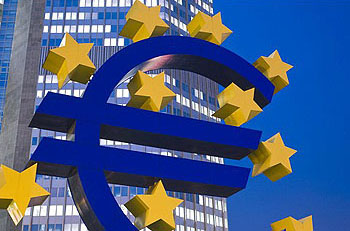With financial contagion from Greece and Ireland starting to spread to Portugal and Spain, the eventual breakup of the euro is becoming at least conceivable. But is it likely? Barry Eichengreen is probably the guy who’s thought the hardest about this, and back in 2007  he concluded that it was extremely unlikely regardless of circumstances. The folks over at Five Books recently asked him for his latest thinking on the subject:
he concluded that it was extremely unlikely regardless of circumstances. The folks over at Five Books recently asked him for his latest thinking on the subject:
What’s your view now?
Rarely does an academic have the privilege of a real-time test of his hypothesis. With the benefit of that test, I would now say that I was both right and wrong. I was right in that, yes, if the Greek government were to announce tomorrow that it had decided to reintroduce the drachma, it would precipitate the mother of all financial crises. Everyone would know that its intention was to depreciate the new drachma, so in the first minute everyone would rush to get their money out of the country, out of its banks, and out of its bond market. The result would be the biggest bank run and financial crisis the world has ever seen. This danger is a formidable deterrent to even contemplating going down this road. So I think the argument I made in 2007, that attempting to exit the euro area would be the equivalent of burning down your own house in order to find a way out, was exactly right.
In what way were you wrong?
I was wrong in that, as Paul Krugman observed earlier this year, if the house is burning down anyway, then the normal advice not to play with matches loses much of its force. If there’s a run on your banking system anyway, then the deterrent to action no longer applies. If there’s a run on your banking system and you have to close down your banks and financial markets anyway, you may want to take that opportunity to reintroduce your own currency. I still don’t think that things will be allowed to get to this point, but I no longer attach a zero probability to a country’s exiting the euro — just a close to zero probability. Never say never, but I still believe that the euro is an example of a path-dependent historical process that is unlikely to be reversed.
I think he’s probably right. But I’m also not entirely sure of that. So far there’s been no sign of a serious run on any euro-area banking system, but there have been signs of a “bank walk,” for lack of a better term. And that could lead to a run on one bank which, in turn, could lead to a run on so many banks that the European monetary authorities can’t stop it. Megan McArdle’s warning that pundits “have started seeing Creditanstalt everywhere” is a good one, but this is still a scary process we’re going through. I’m not sure exactly what nonzero probability Eichengreen would attach to a euro breakup, but even five or ten percent is pretty serious. Buckle up.
As always, Paul Krugman has more. So does Tyler Cowen, who is pessimistic. “In a nutshell,” he says, “we’re watching the most pitched, highest-stakes, most determined battle between politics and finance which has been staged. I am expecting finance to win.”













